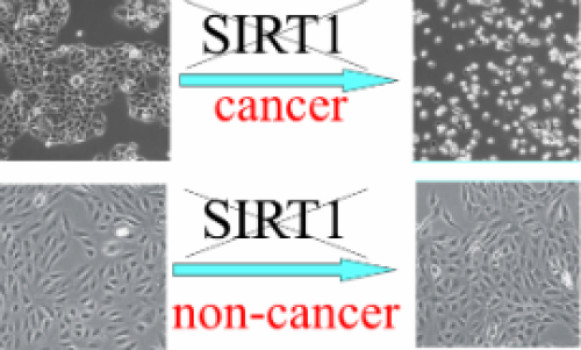
Scientists at the University of York are working on a promising new approach for tackling colorectal cancer, the second most common cause of cancer-related death.
The new method works by silencing cancer ‘survival genes’ and could potentially combat cancer through the selective killing of colorectal cancer cells without adverse effects on normal, non-cancer cells.
Funded by York’s Centre for Chronic Diseases and Disorders (C2D2), the project led by Professor Jo Milner from York’s Department of Biology involved preliminary studies to establish the suitability of an ex vivo model for the future development of anti-cancer therapies for colorectal cancer using a technique called RNA interference.
The new approach builds on ground-breaking research by Professor Milner and her team at York more than a decade ago. This early work, funded by Yorkshire Cancer Research (YCR), used the newly-developed technique of RNA interference to successfully kill human cervical cancer cells grown in culture without causing damage to healthy cells.
Professor Milner explained: “When a mammalian cell elects to die it does so with great precision and without harming its neighbours. This process of ‘programmed cell death’ enables the continuous replacement of aging cells and also the sculpting of tissues and neuronal pathways.
“However, when this normal process of programmed cell death fails the continued abnormal growth of affected cells can lead to cancer. Some cancers develop following infection with a virus, such as human papilloma virus which causes human cervical cancer. Here the virus expresses specific viral genes that disrupt normal cellular control mechanisms resulting in abnormal cell proliferation and survival.
“Using RNA interference (RNAi) we first identified the viral gene responsible for the continued survival of cervical cancer cells. Then we established the feasibility of RNAi-based therapeutics for the selective killing of human cervical cancer cells growing in vitro.”
Professor Milner and her team next studied cells from other cancer types, including colorectal cancer and breast cancer. Such cancers develop when the cell’s internal control system fails due to damage to one or more of the regulatory genes.
Professor Milner said “We discovered that other genes, belonging to a group called stress-response genes, acquire a new pro-survival function during the process of cancerous transformation. Importantly, this acquired cancer-specific survival function operates under normal, physiological conditions. Silencing these cancer-specific survival genes by RNA interference causes the cancer cells to die while the survival of non-cancerous cells appears normal. This is in contrast to treating cancer by radiotherapy and/or genotoxic drugs — these agents cause genotoxic stress and damage both cancer and normal cells and tissues in the body, resulting in unwanted adverse side effects for the patient.”
For the work on colorectal cancer therapies to progress towards the clinic, the team has had to meet the challenge of modifying the agent siRNA. siRNA is the synthetic RNA molecule which is designed to silence a chosen gene by inducing RNA interference and selectively suppressing expression of that gene. However, siRNA is very unstable and is rapidly degraded when in contact with human tissues.
As reported in the journal Molecular Therapy, the team has now successfully met this challenge and converted the unstable siRNA molecule into a stable form without losing its ability and very high efficacy for targeted gene silencing. A novel siRNA/DNA has been shown to be resistant to degradation while retaining high efficacy and selectivity for target gene silencing when tested on human cancer cells grown in culture.
The next step will involve testing this novel therapeutic agent for cancer-specific cell killing using human tissue maintained ex vivo, using an experimental model which was validated in the course of the C2D2-funded research.
Professor Paul Kaye, Director of C2D2, said: “Professor Milner’s team has now shown that ex vivo cultures of colorectal tumour material, derived from human patients, maintain cancer-related biochemistry over several days, and of sufficient time known to produce a killing effect with the novel siRNA/DNA in vitro. It is marvelous that C2D2 has been able to support this ground breaking research that has validated an ex vivo model that can be used to progress this novel therapeutic towards the clinic, and without the need for animal research.”
Story Source:
The above story is based on materials provided by University of York. Note: Materials may be edited for content and length.
Journal Reference:
- Simon J Allison, Jo Milner. RNA Interference by Single- and Double-stranded siRNA With a DNA Extension Containing a 3′ Nuclease-resistant Mini-hairpin Structure. Molecular Therapy—Nucleic Acids, 2014; 2 (12): e141 DOI: 10.1038/mtna.2013.68
